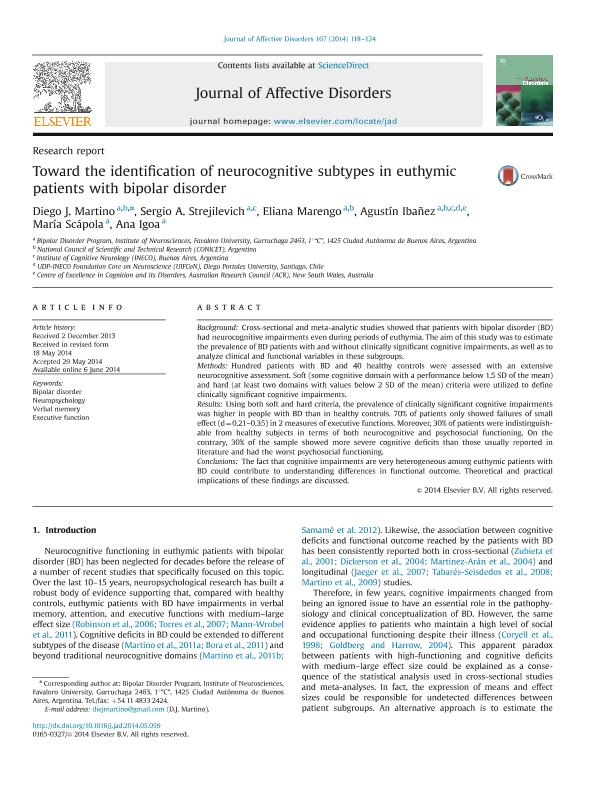Artículo
Toward the identification of neurocognitive subtypes in euthymic patients with bipolar disorder
Martino, Diego Javier ; Strejilevich, Sergio; Marengo, Eliana
; Strejilevich, Sergio; Marengo, Eliana ; Ibañez, Agustin Mariano
; Ibañez, Agustin Mariano ; Scápola, María; Igoa, Ana
; Scápola, María; Igoa, Ana
 ; Strejilevich, Sergio; Marengo, Eliana
; Strejilevich, Sergio; Marengo, Eliana ; Ibañez, Agustin Mariano
; Ibañez, Agustin Mariano ; Scápola, María; Igoa, Ana
; Scápola, María; Igoa, Ana
Fecha de publicación:
06/2014
Editorial:
Elsevier
Revista:
Journal of Affective Disorders
ISSN:
0165-0327
Idioma:
Inglés
Tipo de recurso:
Artículo publicado
Clasificación temática:
Resumen
Background: Cross-sectional and meta-analytic studies showed that patients with bipolar disorder (BD) had neurocognitive impairments even during periods of euthymia. The aim of this study was to estimate the prevalence of BD patients with and without clinically significant cognitive impairments, as well as to analyze clinical and functional variables in these subgroups.
Methods: Hundred patients with BD and 40 healthy controls were assessed with an extensive neurocognitive assessment. Soft (some cognitive domain with a performance below 1.5 SD of the mean) and hard (at least two domains with values below 2 SD of the mean) criteria were utilized to define clinically significant cognitive impairments.
Results: Using both soft and hard criteria, the prevalence of clinically significant cognitive impairments was higher in people with BD than in healthy controls. 70% of patients only showed failures of small effect (d=0.21–0.35) in 2 measures of executive functions. Moreover, 30% of patients were indistinguishable from healthy subjects in terms of both neurocognitive and psychosocial functioning. On the contrary, 30% of the sample showed more severe cognitive deficits than those usually reported in literature and had the worst psychosocial functioning.
Conclusions: The fact that cognitive impairments are very heterogeneous among euthymic patients with BD could contribute to understanding differences in functional outcome. Theoretical and practical implications of these findings are discussed.
Palabras clave:
Bipolar Disorder
,
Neuropsychology
,
Verbal Memory
,
Executive Function
Archivos asociados
Licencia
Identificadores
Colecciones
Articulos(SEDE CENTRAL)
Articulos de SEDE CENTRAL
Articulos de SEDE CENTRAL
Citación
Igoa, Ana; Scápola, María; Ibáñez Barassi, Agustín Mariano; Strejilevich, Sergio; Martino, Diego Javier; Marengo, Eliana; et al.; Toward the identification of neurocognitive subtypes in euthymic patients with bipolar disorder; Elsevier; Journal of Affective Disorders; 167; 6-2014; 118-124
Compartir
Altmétricas



